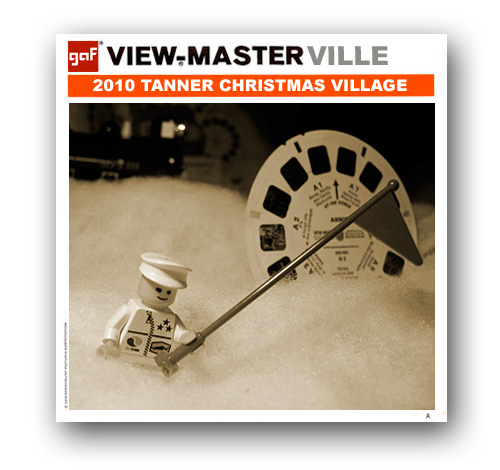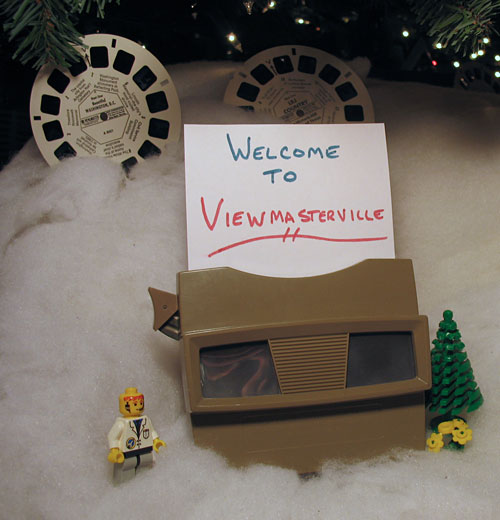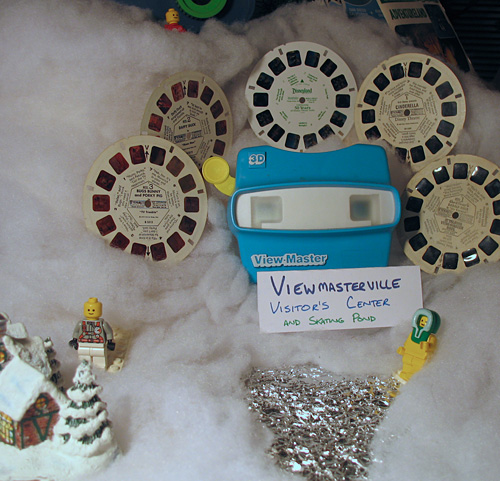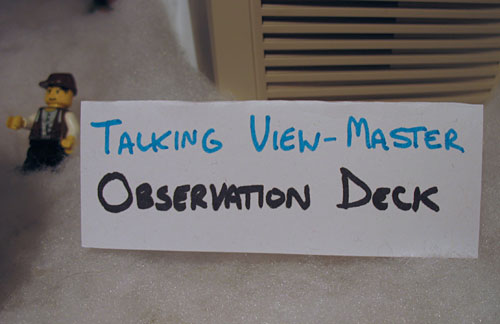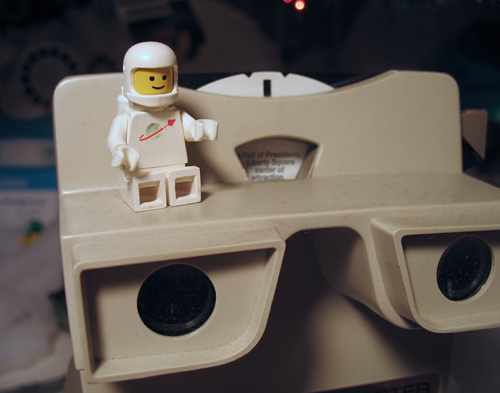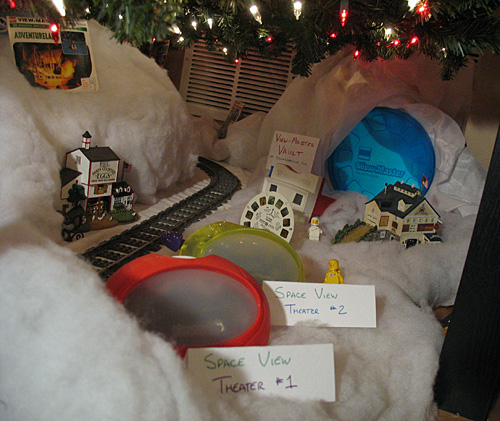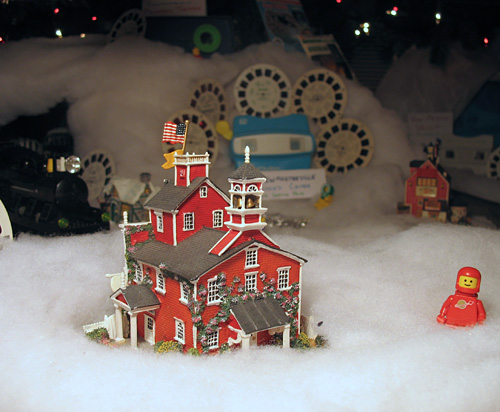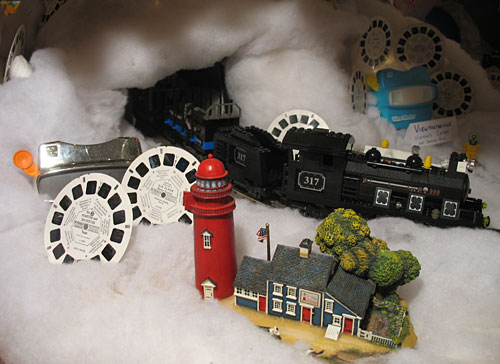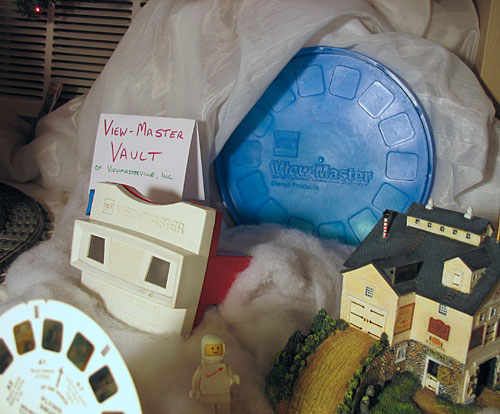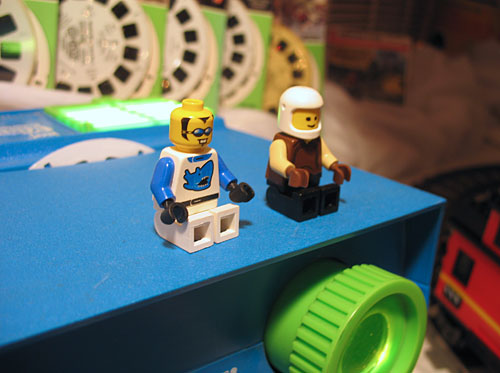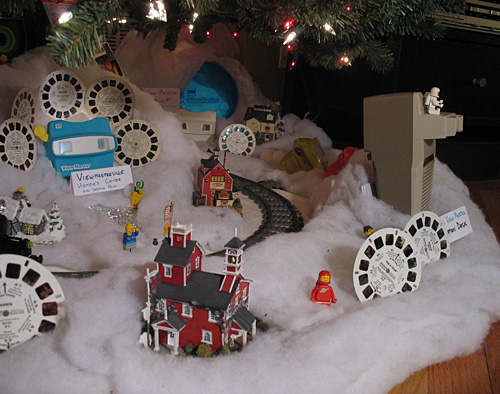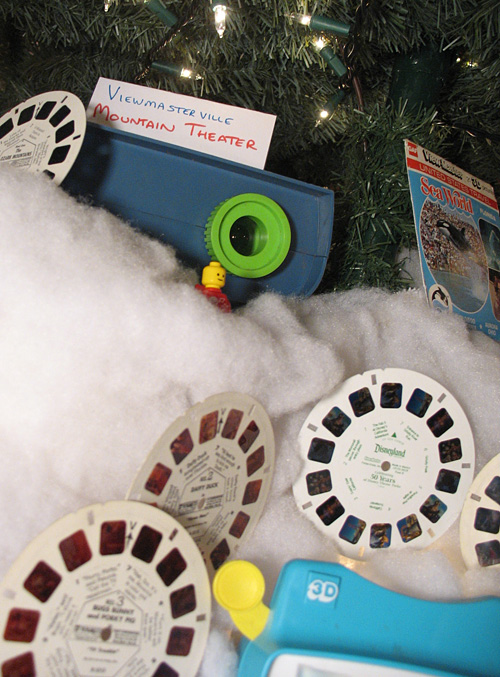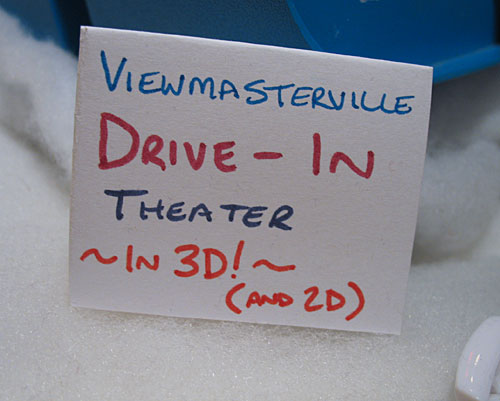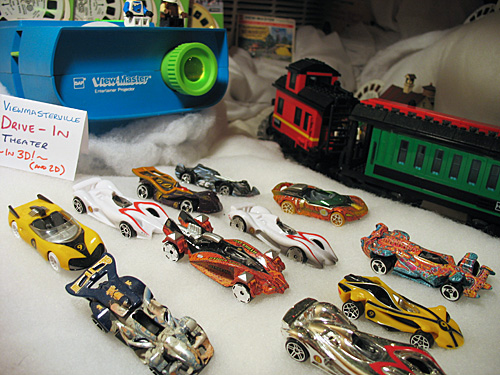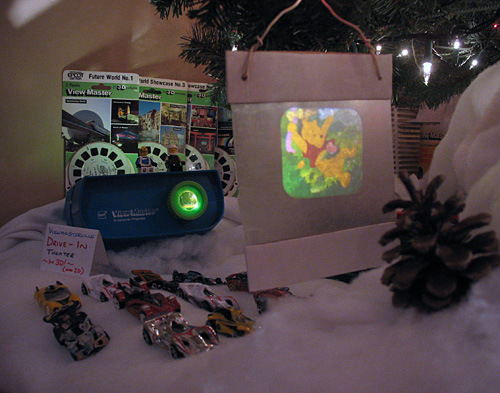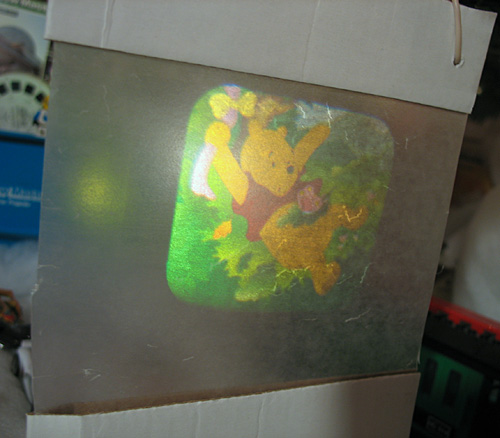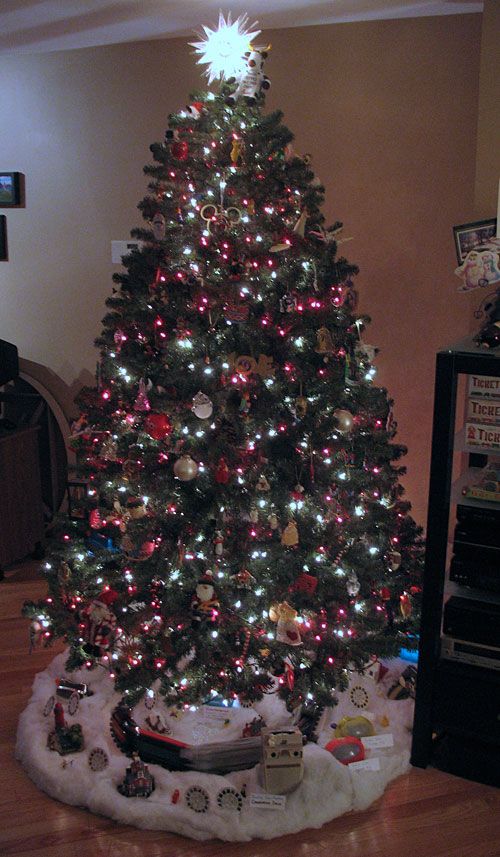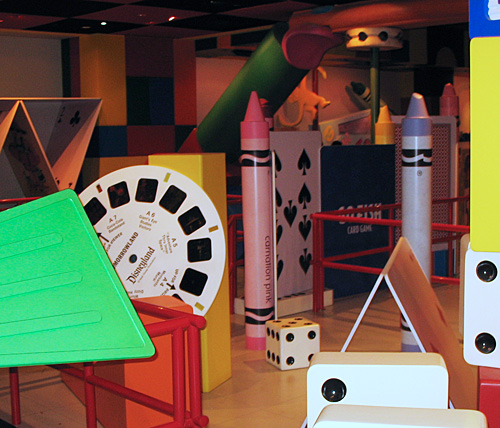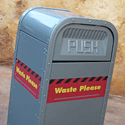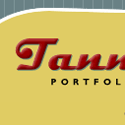Once upon a time there was a small, rural town by the name of Sawyerville. With all the main industries long gone, to help their tax base they attempted to refocus their promotional ventures towards tourism.
Noting Hollywood's creatively-bankrupt strategy of making every possible movie in 3D to produce inflated ticket prices, the town's Chamber of Commerce thought they could do something similar.
Thus they obtained a license from Fisher-Price, the current rights holders of the View-Master brand, to rename their municipality to "View-Masterville".
A name change wasn't the only development that came to town, however. They also started to construct large buildings in the shapes of historical View-Master viewers and equipment.
Visitors would enter these life-sized viewers in order to see short 3D films and slideshows… after paying inflated admission prices, of course.
These large View-Master structures were situated throughout the town, alongside historical buildings, shops, and residences.
Given the town's location in a mountainous region, as well as direct access to a railway, it was decided that the View-Master Vault would also be built in View-Masterville.
This large structure housed historical copies of reels and other View-Master paraphernalia, all located behind a large rolling door that resembled a View-Master reel itself.
You'd often find town residents and visitors wearing protective goggles and oxygen masks. This is due to the exposure of the industrial solvent trichloroethylene (TCE), a carcinogen used to clean and degrease parts and equipment.
The EPA is looking into claims that View-Masterville disposed of the chemical on-site.
Probably the largest attractions to View-Masterville are its two outdoor theaters. The first is the Mountain Theater, located above the city center. At night, it projects short films upon the mountainside by using 4 D-sized batteries (it's quite energy efficient!)
The second, and most popular destination, is the View-Masterville Drive-In Theater. This is located on the edge of town and allows for cars to park outside and view both 2D and 3D films. There's also seating on top of the large projection building itself.
Unlike its sibling Mountain Theater, this sucker is electrical, but it needs a nuclear reaction to generate the 1.21 gigawatts of electricity to properly project each evening.
Cars can park in the snow at the theater and watch actual films projected on a screen that is magically hanging from a tree branch "suspended from the sky." Amenities like a snack bar, in car stereo audio, and superimposed subtitles on car windshields are also available at the Drive-In Theater.
Currently showing is a Winnie the Pooh film, in anticipation for the new Walt Disney Animation Studios release in 2011. Now's your chance to catch previous favorites here in town!
We hope you enjoyed this tour of the up-and-coming tourist destination of View-Masterville. Hop the train and drop by a for a visit sometime!
~/~
Behind the Scenes
Once again, I decided to build a themed village to sit under our Christmas tree.
For many years I used LEGO to create such villages as 'Pirates of the Christmas-be-an', 'A Tour of Jackhannesburg', and 'Christmas on Hoth'.
I then shifted to a couple other building systems including old-school Hot Wheels track for 'A "Cars" Christmas', Lincoln Log-inspired 'Frontier M&M's Christmas', and finally switched to boardgame parts with last year's 'Clue: Murder on the Boddy Express' theme.
This year, partly inspired by all the talk about 3D movies, as well as the personal rediscovery of my own View-Master collection, I decided to try to bring that to the village environment. It's not completely off base. During our trip to Walt Disney World last December, I spotted life-sized View-Master reels in the queue for the Toy Story Midway Mania ride at Disney's Hollywood Studios.
As you can see from the photos featured above, I used a combination of View-Master viewers and the reels themselves to decorate the town. Why exactly are there large reels sitting in the snow? Photo opportunities, of course!
The actual buildings used in the town to compliment the View-Master elements are collectibles that I picked up during my years working at the Bradford Exchange. Similar to the architectural stylings found in Department 56 products, these buildings — from a sister company called Hawthorne Village — were part of two collections based on the artwork of Charles Wysocki and Thomas Kinkade. I often got these building free or at low cost due to sample runs or employee discounts. I figured I might as well put them to use in the village, even though their scale is questionable compared to the LEGO train.
I threw some LEGO minifigures into the town to create the feeling that it was "lived in," but they obviously don't fit the style. I mean, half of them are from the Space theme!
Here's a quick video tour to provide an overview of how everything was placed relative to each other:
My favorite part of the village was building the Drive-In Theater. I was able to rediscover the 2 View-Master projectors I owned, one was batter-powered and the other electric. They don't actually project in 3D, but rather use just 7 of the 14 images found on a reel.
I was able to rig the electric projector to actually display an image on a screen I built from wax paper and cardboard, hung with wire from a tree branch above the scene. This setting was a fan-favorite during our many Festive Film Fridays open house events during the Christmas season.
Beyond the light coming out of the projector, I also rigged some lightbulbs behind the vault door of the View-Master Vault (which produces a blue glow at night) as well as behind the lenses of the viewer branded as the View-Masterville Visitor's Center (which allowed the "eyes" to glow at night, as well as produced a halo of light at the center of the village).
And of course, the common element holding the village together year-to-year is the LEGO train that loops the tree and travels through a tunnel. Not much has changed here, given that LEGO has shifted their train products from the 9V electrical system I have to a newer remote control battery-powered system. Maybe someday I'll expand the track layout here beyond an oval.
Incidentally, the original name of the town — Sawyerville — is a callback to View-Master's history. It was originally created by a company called Sawyer's Photo Services, which first sold the product in 1939.
Anyway, that's the story and background on the 2010 Tanner Christmas Village. Thanks for reading! ![]()


